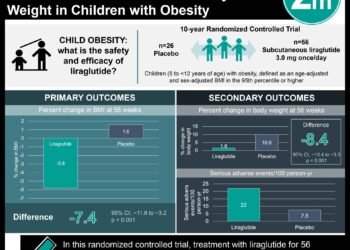Social media marketing increases children’s consumption of unhealthy, but not healthy snacks
1. Children who viewed mock Instagram profiles of popular YouTubers holding unhealthy snacks consumed more calories overall when offered snacks immediately after viewing, compared to children who viewed profiles with healthy snacks or nonfood items.
2. Viewing Instagram profiles with healthy snacks did not affect consumption of healthy snacks.
Evidence Rating Level: 2 (Good)
Study Rundown: Food marketing and product placement in traditional media platforms have been studied for their contribution to childhood obesity, but less is known about the effect of digital food marketing on Internet platforms. In this study, researchers recruited children aged 9 to 11 years in schools in the United Kingdom and randomized them to view mock Instagram profiles depicting famous YouTube video bloggers holding unhealthy snacks, healthy snacks, or branded nonfood items. Children were then offered healthy and unhealthy snacks to eat. Those who viewed the profiles with unhealthy snacks consumed significantly more calories and more unhealthy food than those who viewed the other profiles. Children who viewed the profiles with healthy snacks did not consume more healthy snacks than other groups.
This study was limited by the small, cross-sectional sample. Furthermore, most participants did not report previous exposure to the YouTube influencers they were exposed to, so effect sizes may be underestimated. Nonetheless, the study is strengthened by its randomized design. For physicians, these findings highlight the importance of advocating for food marketing restrictions, and identifying vulnerable children whose social media consumption may increase their risk of obesity.
Click to read the study, published today in Pediatrics
Relevant reading: Children’s Food and Beverage Promotion on Television to Parents
In-Depth [randomized controlled trial]: Researchers recruited a convenience sample of 176 participants aged 9 to 11 years in schools in the United Kingdom, and randomized them to view mock Instagram profiles of top YouTube video bloggers holding unhealthy snacks, healthy snacks, or branded nonfood items. Participants were then offered healthy and unhealthy snacks to eat ad libitum for 10 minutes, after which remaining snacks were removed and weighed. Participants and their parents provided information on participants’ demographics and social media use.
Children who viewed the mock Instagram containing unhealthy snacks consumed 26% more kcals (mean = 448.3 ± 140.82 kcals) compared with those who viewed the nonfood item Instagram (mean = 357.1 ±146.5 kcals; P = .001) and 15% more than those who viewed the healthy snack Instagram (mean = 388.96 ± 145.53; P = .05). There was no significant difference between the kcals consumed between the healthy snack and nonfood item Instagram profiles (P = .55). In addition, children who viewed the unhealthy snack Instagram consumed 32% more kcals from unhealthy snacks compared with children in the nonfood condition (P = .001) and 20% more than children in the health snack condition (P = .03)
Image: CC
©2019 2 Minute Medicine, Inc. All rights reserved. No works may be reproduced without expressed written consent from 2 Minute Medicine, Inc. Inquire about licensing here. No article should be construed as medical advice and is not intended as such by the authors or by 2 Minute Medicine, Inc.







